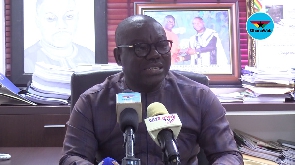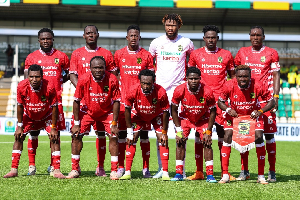In November 2019 when the Akufo-Addo government announced plans to construct a 600-bed hostel for ‘kayayeis’ in the capital city, the Member of Parliament for Bolgatanga Central, Isaac Adongo sarcastically thanked the president on behalf of his people.
The initiative was in furtherance of the New Patriotic Party’s (NPP) campaign promise to head porters who drift mainly southwards from Northern Ghana to work the day away carrying heavy loads in exchange for pittances and retire to dangerous slums daily.
Isaac Adongo’s issue with the initiative at the time had to do with the demeaning nature of the work ‘kayayeis’ did.
Isaac Adongo faulted the vice president for supporting the building of hostels to house ‘Kayeyei’ in Accra, instead of championing the total abolishment of the demeaning trade by the people of the north, from where he hails.
In an interaction with MyNewsGH, he said “I would not be standing here today if I became a Kayayei, but Bawumia says he is going to build a Kayayei house for his sisters from the north, so they would come and sleep and wake up in the morning to go and carry loads at Kantamanto and Makola; we thank him a lot; I say we thank him. He would not become a vice president if he had trodden that path.”
A year down the line, Ghanaians are yet to see any sign of the 600-bed facility that the Akufo-Addo government promised.
Read the full story originally published on November 19, 2019, on Ghanaweb
Bolga Central Member of Parliament (MP), Isaac Adongo has poked President Nana Addo Dankwa Akufo-Addo over government’s decision to construct the first 600-bed hostel facility for head porters, commonly known as “Kayayei” at Agbogblosie in the Greater Accra region, describing the initiative as “nauseating”, MyNewsGh.com reports.
Finance Minister, Ken Ofori-Atta in his 2020 Budget presentation in Parliament on last week Wednesday, November 13, 2019, happily announced that the project which is due to commence next month will “provide accommodation and skills training to these vulnerable young women” and “save them from sleeping under perilous living conditions”.
The initiative is in furtherance of the New Patriotic Party’s (NPP) campaign promise to head porters who drift mainly southwards from Northern Ghana, who work the day away carrying heavy loads in exchange for pittances and retire to dangerous slums on a daily basis, ahead of the 2016 general elections.
Many of them, according to reports are victims of rape and abuse; already, the government has abolished the levying of the ‘Kayayei’ in its maiden budget in 2017 in its quest of relieving the already burdened young women.
But Isaac Adongo faults the vice president for supporting the building of hostels to house ‘Kayeyei’ in the capital city, instead of championing for the total abolishment of the demeaning trade by the people of the north, from where he hails.
“I would not be standing here today if I became a Kayayei, but Bawumia says he is going to build a Kayayei house for his sisters from the north, so they would come and sleep and wake up in the morning to go and carry loads at Kantamanto and Makola; we thank him a lot; I say we thank him; he would not become a vice president if he had treaded that path”, he told MyNewsGh.com in an interview at the Parliament house on Wednesday.
“It is nauseating; I’m from the north and who would they be building that hostel for; it’s being built for my children who must be guided to become better persons in future, but one of our own who have been lucky enough to become a vice president is saying our children should travel to the cities to become Kayayei”, he fumed.
Government, however, maintains that the initiative, like those under the Zongo Development Fund and the Infrastructure for Poverty Eradication Programme (IPEP), would help build a more inclusive society where every community would have equal opportunity in getting access to basic infrastructure and services like water, toilets, market, education and health.
General News of Thursday, 19 November 2020
Source: www.ghanaweb.com













